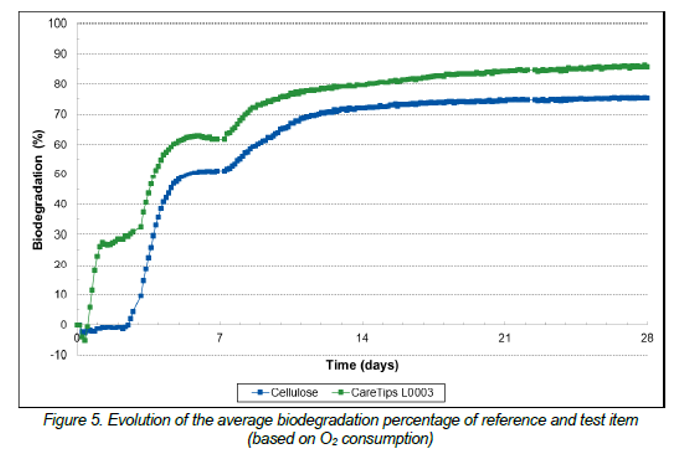
Biodegradability/Biodegradation : a controlled end-of-life material
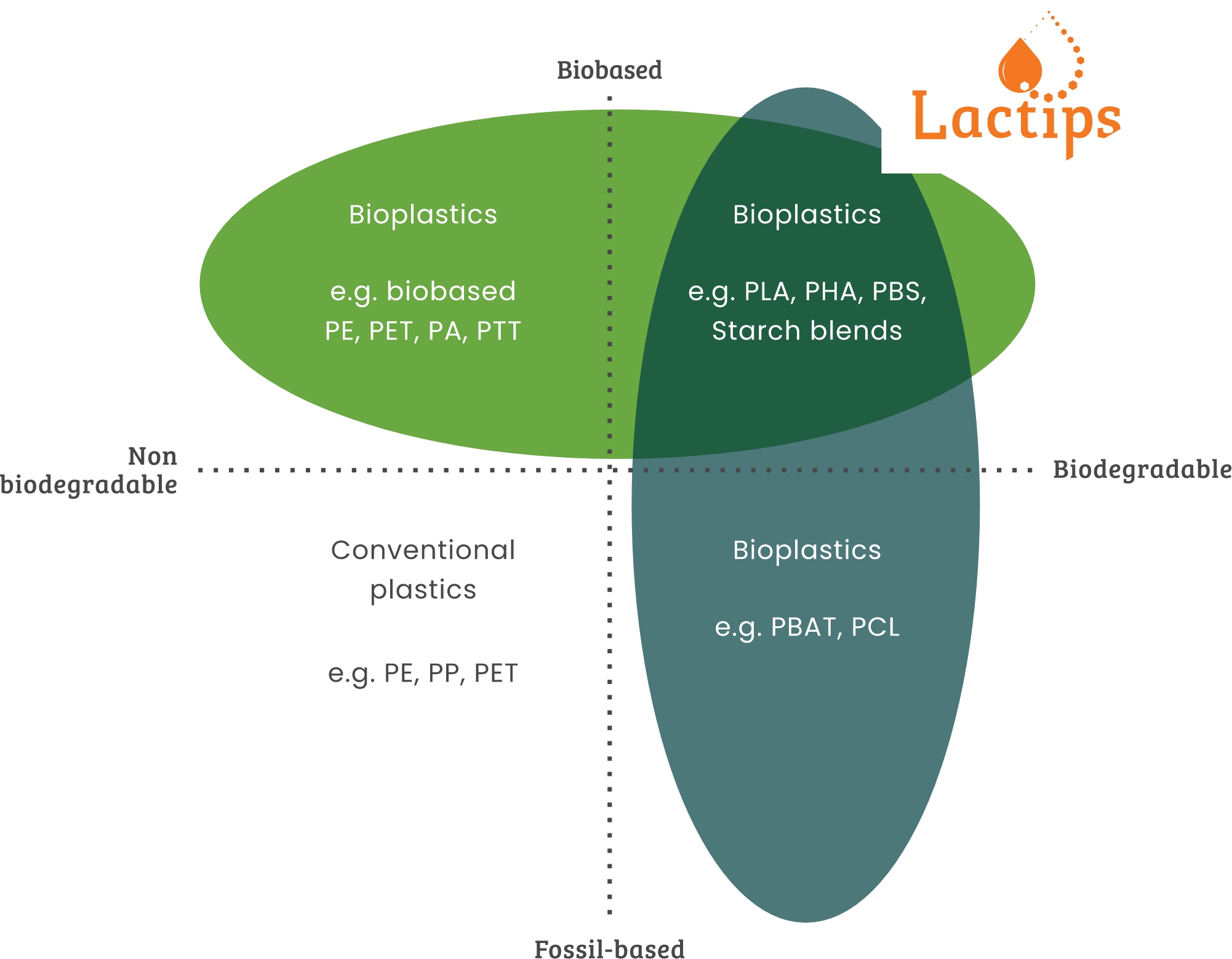
Biodegradability is a confusing term. Some materials can be biodegradable in thousands of years; however, this would cause huge environmental problems during the biodegradation time. To understand biodegradability it is essential to take into account that it depends on the environment (temperature, humidity and microorganisms available) and the time.
What is Biodegradability ? It is the capacity for biological degradation of organic materials by living organisms down to the base substances such as water, carbon dioxide, (sometimes) methane, basic elements and biomass. Biodegradation is a bio-chemical process that refers to the degradation and assimilation of polymers by living microorganisms, to produce degradation products.
Not all biodegradable products are made from bio-based materials. And vice versa, not all bio-based products are biodegradable.
Biodegradation depends on several factors. Time, temperature and presence of microorganisms in the specific environment. For example, an industrial compostable product will not end up in compost if we throw into nature.
Biodegradation takes quite a bit of time, depending on the environment. In industrial composting, materials need to biodegrade within six months, but in open environments, it will take much longer, often at least a year or several years.
Although CareTips® has passed successfully biodegradability tests. Verification on the final product is normally needed to ensure a correct biodegradation in each specific environment.
BIODEGRADABILITY IN CONTROLLED ENVIRONMENTS
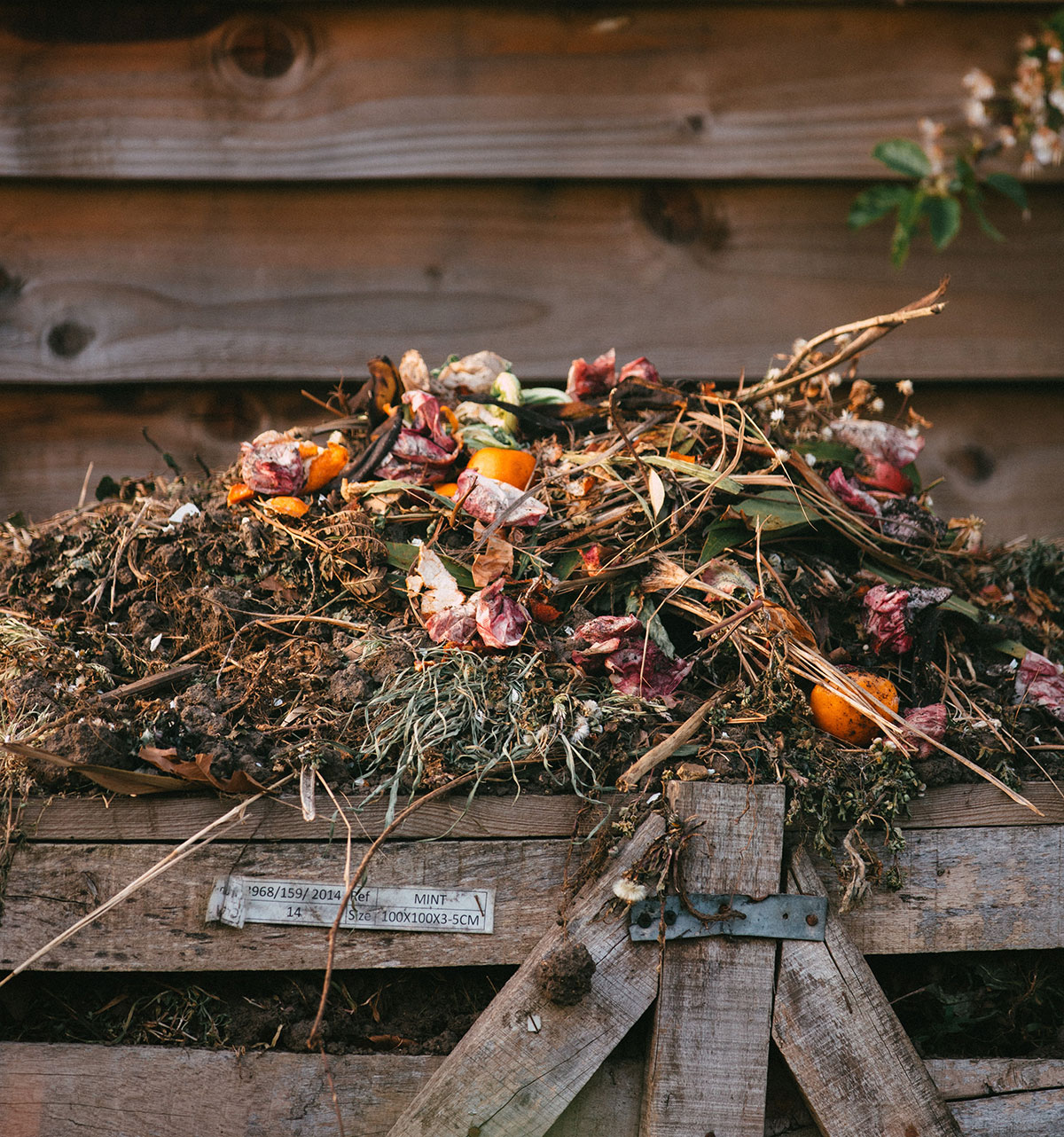

HOME COMPOST
When referring to “home” composting, a cooler aerobic breakdown of organic material or waste is meant, usually in small-scale composters and by ‘slow-stack’ treatment methods. Temperatures are in the psychrophilic (0-20 ºC) to mesophilic (20-45 ºC) ranges. The volumes treated in home composting are considerably smaller than in industrial composting and the compost is usually used in private gardens.
In some European countries home composting has been identified as an opportunity for managing a part of the domestic biodegradable waste stream. Minimising the amount of waste collected for landfill disposal contributes to achieving reductions in landfilling of biodegradable waste required by the EU Landfill Directive. European Bioplastics Factsheet on Home Composting April 2015.
Owing to the comparatively smaller volume of waste involved, the temperature in a garden compost heap is clearly lower and less constant than in an industrial composting environment. This is why composting in the garden is a more difficult, slower-paced process.
TÜV AUSTRIA’s innovative answer to this challenge was to develop OK compost HOME to guarantee complete biodegradability in the light of specific requirements, even in your garden compost heap.
CareTips® 300A pellets are certified by OK compost HOME conformity mark of TÜV AUSTRIA Belgium. This involves the requirements of the European norm EN 13432 Requirements for packaging recoverable through composting and biodegradation - Test scheme and evaluation criteria for the final acceptance of packaging with demonstration of biodegradation and disintegration at ambient temperature (30ºC maximum 12 months). It is important to point out that the certification program OK compost HOME does not explicitly refer to a certain standard, but lists all technical requirements a product has to meet to obtain certification.
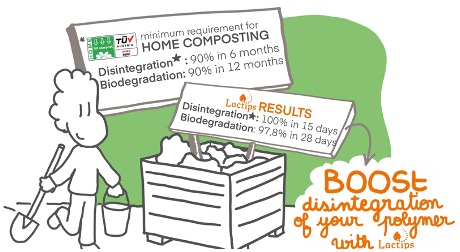
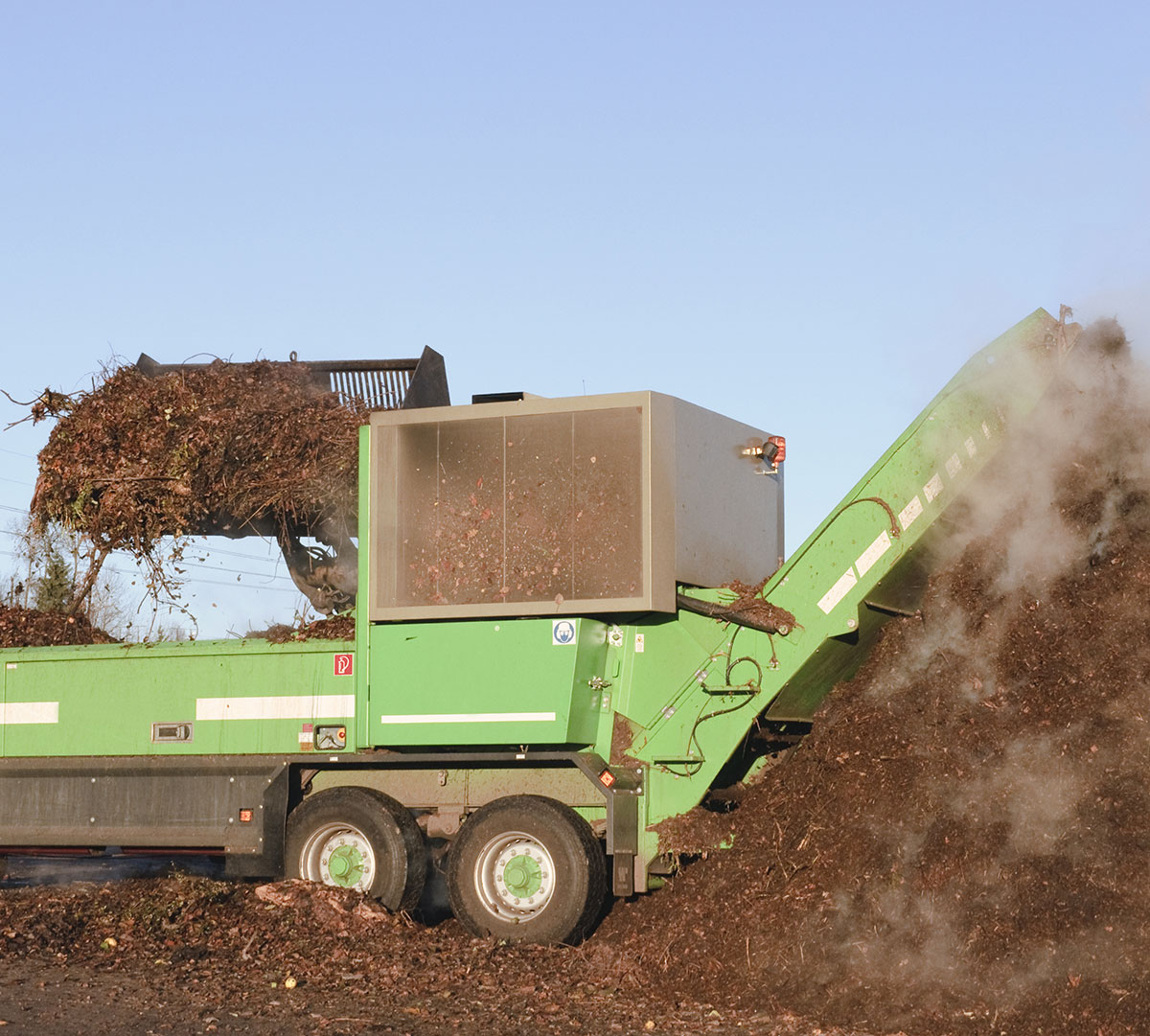
INDUSTRIAL COMPOST
The EN 13432 standard “Packaging - Requirements for packaging recoverable through composting and biodegradation - Test scheme and evaluation criteria for the final acceptance of packaging” specifies requirements and procedures to determine the compostability and anaerobic treatability of packaging and packaging materials. It addresses the following characteristics: biodegradability, disintegration during biological treatment, effect on the biological treatment process and effect on the quality of the resulting compost. For additional information please see European Bioplastics Factsheet ‘EN13432 Certified Bioplastics Performance in Industrial Composting’ April 2015.
A product or a basic material fulfilling the requirements of biodegradation of the OK compost HOME mark or the OK biodegradable WATER mark is regarded as fulfilling the requirements of biodegradation of the OK compost INDUSTRIAL mark.
Since the requirements of OK Home Compost are based on the norm EN13432, and are more strict than Industrial Compost requirements, the biodegradability of CareTips® material in Industrial compost conditions is assumed. However, biodegradability tests can be done under request for this environment.
CareTips® 300B was tested under ISO 15985, the test is considered valid if
a) the percentage biodegradation of the reference material is more than 70 % after 15 days, and
b) the difference between the percentage biodegradation of the reference material in the different vessels is less than 20% of the mean value. Both requirements were fulfilled.
Recyclability
CareTips material helps recyclability of paper packaging.
BIODEGRADABILITY IN UNCONTROLLED ENVIRONMENTS

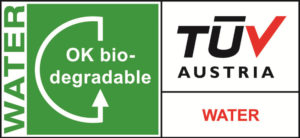
Fresh water biodegradation
Soluble polymers are sometimes intentionally released to the environment for certain applications. These can include dishwasher tabs or washing machine pods. We need to ensure that these soluble polymers are also water biodegradable to guarantee that no negative effects will be produced in the final environment.
Products certified for OK biodegradable WATER guarantee biodegradation in a natural fresh water environment, and thus substantially contribute to the reduction of waste in rivers, lakes or any natural fresh water.
CareTips® 300A material will completely dissolve and biodegrade in water without causing any toxicity or damage to the environment. Heavy metals content is also tested in this certification.
CareTips® 300A are certified by TÜV Austria certifications schemes for fresh water biodegradability.
We have also performed for all of CareTips grades biodegradability tests according to the International Norm ISO 14851 (Determination of the ultimate aerobic biodegradability of plastic materials in an aqueous medium – Method by measuring the oxygen demand in a closed respirometer) in the University of Saint Etienne with successful results.
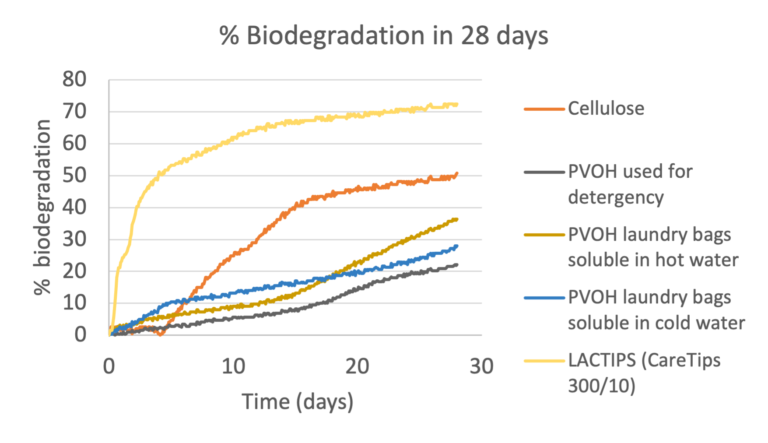


Marine environment
Soluble polymers are sometimes intentionally released to the environment for certain applications. These can include dishwasher tabs or washing machine pods. We need to ensure that these soluble polymers are also water biodegradable to guarantee that no negative effects will be produced in the final environment.
The aerobic biodegradation of test item CareTips® 300B was evaluated in a marine biodegradation test according to ASTM D6691 (2017). The test was performed in triplicate and the incubation temperature was continuously kept at 30°C ± 1°C. The total test duration was 28 days and the final biodegradation percentages are based on CO2 production.
According to the ASTM D6691 (2017) standard, the test is considered valid if the degree of biodegradation of the reference material is > 70% at the end of the test. The results show clearly that the requirement was fulfilled. After 28 days a plateau in biodegradation was reached at a level of 85.7% ± 0.4% for reference item cellulose.
Biodegradation of test item CareTips® 300B started immediately at a good rate. On a relative basis, compared to suitable reference substrate cellulose, a biodegradation percentage of 92.4% was obtained.
According to the OK biodegradable MARINE certification scheme of TÜV AUSTRIA Belgium, a material can only be called biodegradable when the percentage of biodegradation of a test material is at least 90% in total or 90% of the maximum degradation of a suitable reference substrate after a plateau has been reached for both test material and reference substance. The maximum allowed test duration is 6 months. From these results it can be concluded that test item CareTips® 300B fulfilled the 90% biodegradability requirement within 28 days of testing under the given aerobic conditions.

